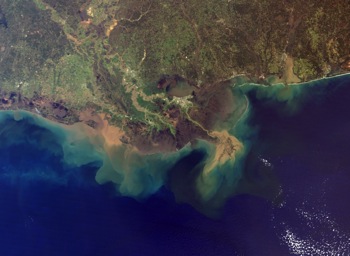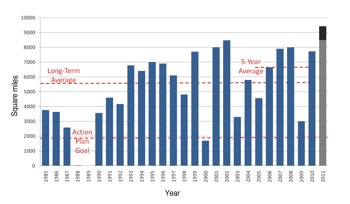Gulf Scientists Predict Worst "Dead Zone" Yet
Published: February 6, 2018
By Daniel Gross

Runoff into the Mississippi River can drastically affect ocean chemistry where it meets the Gulf (Source: Sagredo/Creative Commons).
Scientists think river pollution will make this year’s low-oxygen zone – often called a “dead zone” because it kills marine life – the worst yet.
By Daniel Gross
This summer could be a harsh one for organisms in the Gulf of Mexico, if low-oxygen zones there are as large as expected.
A paper from the National Oceanography and Atmospheric Administration (NOAA) says this year’s low-oxygen (hypoxic) area could be the largest ever. It will encompass a region as large as Lake Erie off the coast of Louisiana and Texas. That’s a serious threat to 9000 square miles of sea life.
Organic matter on the seafloor needs oxygen to decompose, and surface oxygen can’t always keep up. As dead cells sink, oxygen demands rise. That means overabundant life can actually cause “dead zones.”
The problem is that chemical runoff, particularly crop fertilizer, can encourage overabundant life. Nitrogen pollution in the Mississippi River acts like fertilizer for algae. When it decomposes, it sucks oxygen away from the surface.
As a result, runoff drastically affects yearly hypoxic zones. Shrinking them requires scaling back pollutants like manure and nitrogen-rich chemical fertilizers. Right now, few of the Midwest’s farming states limit runoff. The EPA hasn’t stepped in, although NOAA and the EPA have been measuring runoff since 1997.
|
|
This year, nitrogen levels in the Mississippi aren’t abnormally high – but there’s just too much water. Water discharge from the river will be the highest in decades due to the high rains that flooded the river’s floodplains starting in April. All in all, an overall unprecedented amount of nitrogen will be delivered to the Gulf.
Authors of the study say drastic or unexpected weather patterns could affect their prediction. But their model has closely approximated “dead zones” in the past.
This is particularly bad news for a fishing industry still recovering from last year’s oil spill For now, Gulf fishing may be at odds with Midwest farming – at least until effective regulations are in place.
Back to Living on Earth
Living on Earth wants to hear from you!
Living on Earth
62 Calef Highway, Suite 212
Lee, NH 03861
Telephone: 617-287-4121
E-mail: comments@loe.org
Newsletter [Click here]
Donate to Living on Earth!
Living on Earth is an independent media program and relies entirely on contributions from listeners and institutions supporting public service. Please donate now to preserve an independent environmental voice.
NewsletterLiving on Earth offers a weekly delivery of the show's rundown to your mailbox. Sign up for our newsletter today!
 Sailors For The Sea: Be the change you want to sea.
Sailors For The Sea: Be the change you want to sea.
 The Grantham Foundation for the Protection of the Environment: Committed to protecting and improving the health of the global environment.
The Grantham Foundation for the Protection of the Environment: Committed to protecting and improving the health of the global environment.
 Contribute to Living on Earth and receive, as our gift to you, an archival print of one of Mark Seth Lender's extraordinary wildlife photographs. Follow the link to see Mark's current collection of photographs.
Contribute to Living on Earth and receive, as our gift to you, an archival print of one of Mark Seth Lender's extraordinary wildlife photographs. Follow the link to see Mark's current collection of photographs.
 Buy a signed copy of Mark Seth Lender's book Smeagull the Seagull & support Living on Earth
Buy a signed copy of Mark Seth Lender's book Smeagull the Seagull & support Living on Earth


